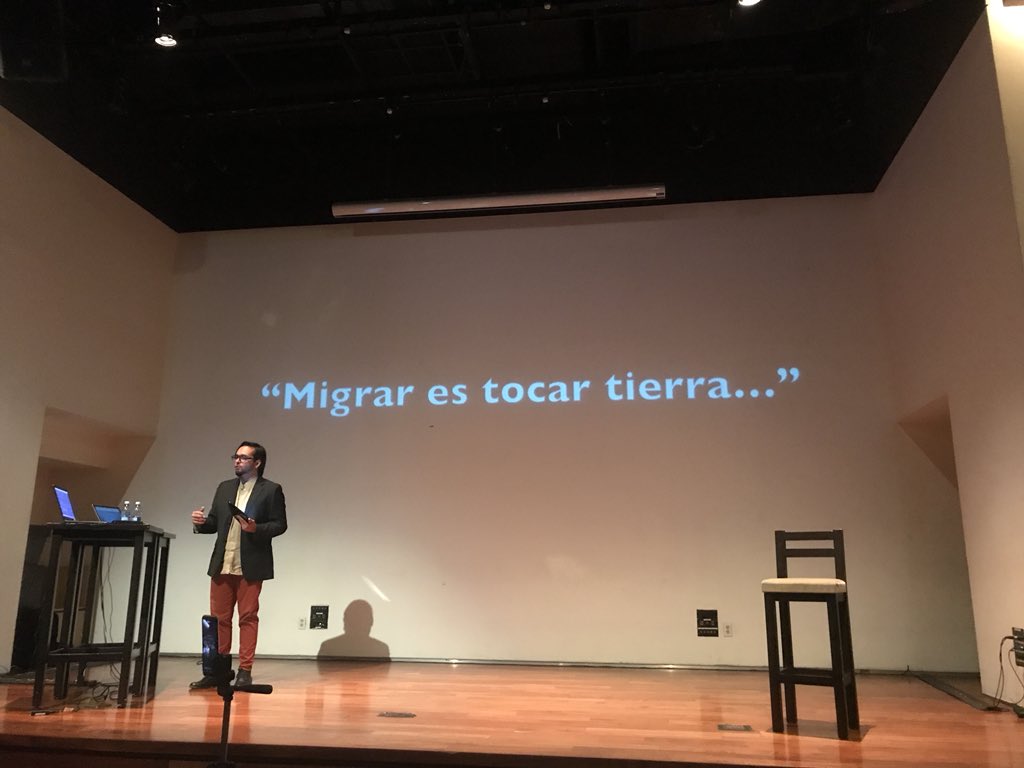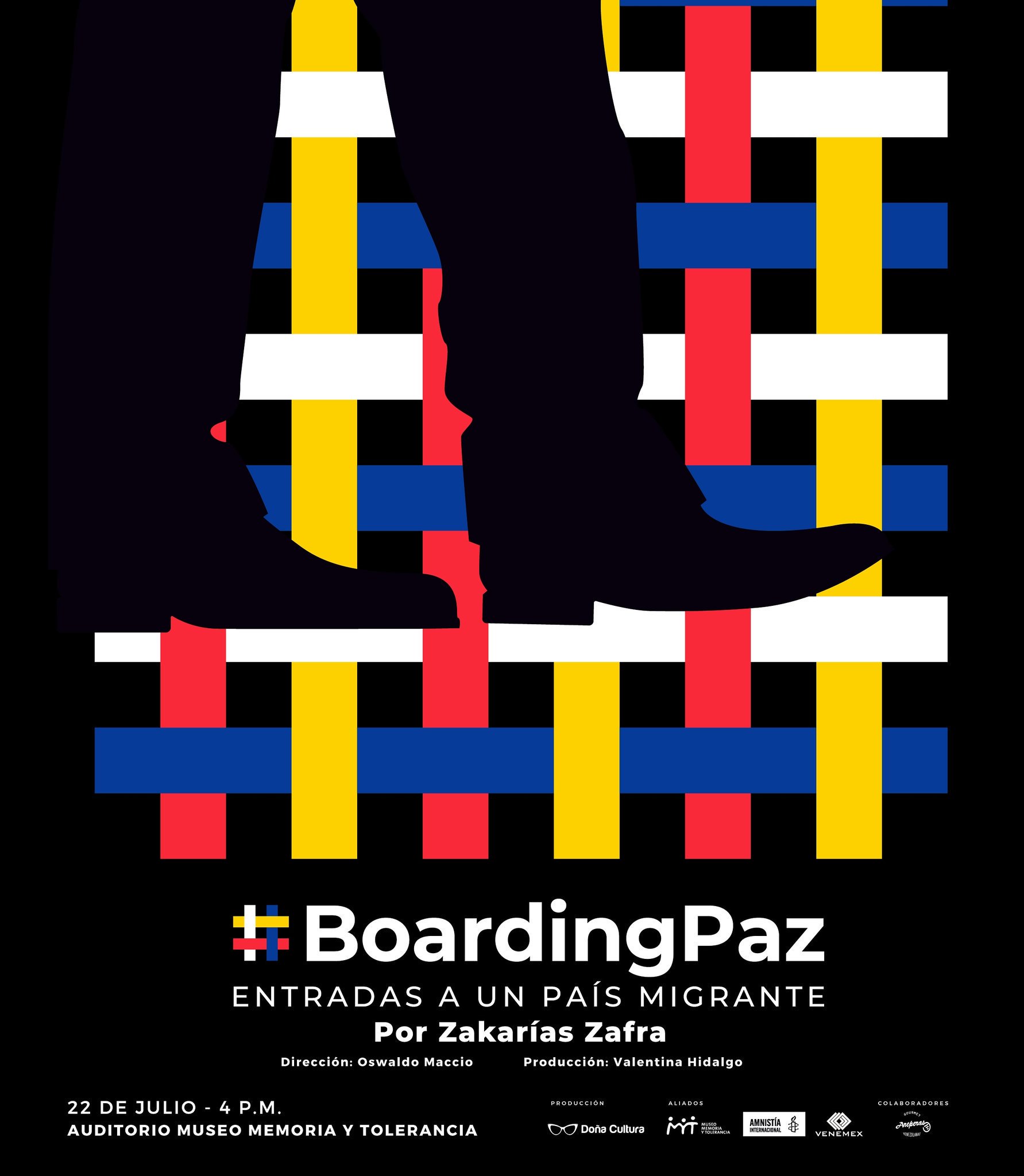#BoardingPaz: Venezuelan Immigration Takes Center Stage in CDMX
#BoardingPaz. Entradas a un país migrante is a multimedia conference that centers around the issues Venezuelan immigrants face all around the world. How do we relate to the immigration process and phenomenon? But most importantly: how do we talk about it?


Photo: @juandgarciia
#BoardingPaz. Entradas a un país migrante is a multimedia conference, a hybrid between a theatre monologue and an oral presentation about the causes, vicissitudes and challenges of the wave of Venezuelan immigrants spread across numerous nations around the globe. Is it a performance, conference or monologue? Its unclassifiable nature is ultimately its greatest advantage when it comes to connecting with the audience.
The piece is based on the stories and contradicting views the migratory phenomenon created by the Bolivarian revolution, unprecedented in our country’s history. This piece brings together journalistic investigation, social media controversies and personal testimonies. Writer, editor and poet Zakarías Zafra; journalist and cultural manager Valentina Hidalgo and actor, director and playwright Oswaldo Maccio (all currently residing in Mexico City) are behind this experiment, in charge of playwriting, producing and stage direction respectively. #BoardingPaz premiered on July 22 this year, in the auditorium of the Memory and Tolerance Museum to a full house, which shows the active promotion displayed by the entire team, supported by the museum, Amnesty International and Venemex (Association of Venezuelans in Mexico).
Zafra is the speaker-character-writer whose adventure starts with a game of affirmation and refutation. At first, he was meant to participate in a literary event and immediately return to Barquisimeto, his hometown. However, he knew it wouldn’t be like that. The return wasn’t decided, it depended on whether he found a job. As it always happens in the case of immigrants, finding a job and a place to stay require both talent and luck: being in the right place at the right time. He found a job in an editorial company and a room in the same area, a big advantage amidst the colossal Mexico City. Sadly, the apartment’s owner evicted Zafra a few days later with the excuse that Venezuelans are dirty and messy. A Mexican co-worker he had just met, offered him to stay in a spare room in her home where she lived with her husband.
Zafra is the speaker-character-writer whose adventure starts with a game of affirmation and refutation.
Besides solving basic needs and avoiding trouble with the authorities, migrants need to be emotionally resilient to overcome the loss of everything one was and had back in one’s homeland. Zafra narrates these difficulties which include an overwhelming anxiety. Eventually, he had to make a tough choice: since his passport was nearing the expiration date and the Bolivarian tyranny prevents us from renewing it in consulates, he had to return to Venezuela. Even though he left in 2016, the country’s fast decline brings such astonishing changes that it’s easy to feel out of place after a short time abroad. He realized he was already an immigrant, a dweller of that strange no-man’s land where those who left move with a unique power, tempered in the fire of reality.
The recreation of Zafra’s experience in his two years abroad allows the connection with the experiences of other connationals. #BoardingPaz invites both Venezuelans and citizens of host countries to think in terms of common experiences. These goals are so important that the creators resorted to setting up focus groups before the premiere, to get impressions about the audience’s possible reactions. Regarding this last point, a few questions remain: did the presentation achieve this latter goal? Is it part of the work to study whether these goals are fulfilled and modify whatever necessary? Is the audience solely responsible for establishing networks? Or is it possible to see beyond the play and the interaction it garners? Which networks are they talking about?
Since it’s a multimedia conference, #BoardingPaz takes all the necessary liberties to cast this story in the common landscape of national contemporaneity, the Bolivarian revolution. Among the most important causes of the exodus, Venezuela suffers one of the worst economic crisis in the world’s recent history, but there’s also the climate of polarization that contributes to the imposition of hate. On the other hand, it shows differences and accusations between those who left and those who stayed, which result in Twitter controversies. It’s worth noting that #BoardingPaz also presents the point of view of the universally hated government supporters who decided to leave the country. To conclude the presentation, Zafra proposes that the audience creates a collective poem through tweets—an “exquisite corpse” in the terms of French surrealists from a century ago—based on the words “migrar es tocar tierra.” The result can be found on Twitter under the hashtag #BoardingPaz. The last verse will be the starting point for other poems in coming presentations.
#BoardingPaz takes all the necessary liberties to cast this story in the common landscape of national contemporaneity, the Bolivarian revolution.
I already stated that #BoardingPaz’s greatest virtue is that it’s a hybrid between the conference and the spectacle. Reality asserts itself in terms of empathy, through the natural demands of a staged story. It was an accurate choice to compose an original score, as well as the use of video and images, although we could ponder whether the discreet drama of the music performed by Zafra with a keyboard plugged to a computer is necessary. But, in any case, the chosen format allows them to review this thanks to its inherent flexibility.
Given #BoardingPaz’s dialogical and interactive nature, we could question certain aspects of the political point of view it presents. For example, it claims that the climate of hate in Venezuela can be blamed both on the government and the opposition. As an spectator, I disagree because the great author of that climate is power itself: chavismo-madurismo. Indeed, the unleashed hate turns against the internally divided dissident population, but I think we can’t forget the role that state power has played in the decline of national cohabitation until it reached its current extremes.
#BoardingPaz opens the way for a subject whose relevance must not be underestimated; it deserves to get the financing to reach other cities beyond the capital and even other countries. It’s doubtlessly ideal for universities, museums, human rights organizations and experimental theatre festivals. As a Venezuelan and a writer, I feel represented by this work whose freshness and seriousness show the dialogue between our people’s talent in other societies and cultures. Congratulations to Zacarías Zafra, Valentina Hidalgo and Oswaldo Maccio.
Caracas Chronicles is 100% reader-supported.
We’ve been able to hang on for 22 years in one of the craziest media landscapes in the world. We’ve seen different media outlets in Venezuela (and abroad) closing shop, something we’re looking to avoid at all costs. Your collaboration goes a long way in helping us weather the storm.
Donate






